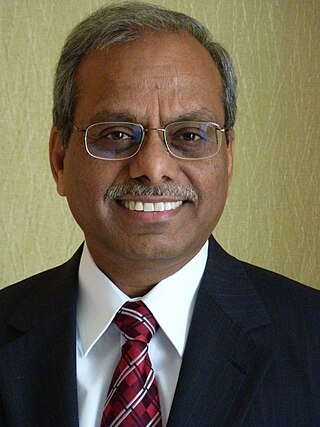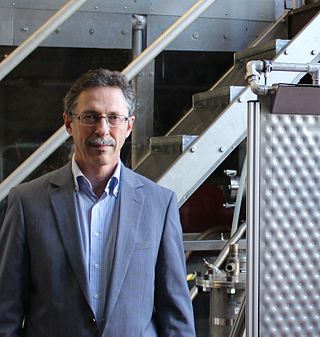Related Research Articles
Model predictive control (MPC) is an advanced method of process control that is used to control a process while satisfying a set of constraints. It has been in use in the process industries in chemical plants and oil refineries since the 1980s. In recent years it has also been used in power system balancing models and in power electronics. Model predictive controllers rely on dynamic models of the process, most often linear empirical models obtained by system identification. The main advantage of MPC is the fact that it allows the current timeslot to be optimized, while keeping future timeslots in account. This is achieved by optimizing a finite time-horizon, but only implementing the current timeslot and then optimizing again, repeatedly, thus differing from a linear–quadratic regulator (LQR). Also MPC has the ability to anticipate future events and can take control actions accordingly. PID controllers do not have this predictive ability. MPC is nearly universally implemented as a digital control, although there is research into achieving faster response times with specially designed analog circuitry.

The Gubkin Russian State University of Oil and Gas is a public university in Moscow, Russia. The university was founded in 1930 and is named after the geologist Ivan Gubkin. The university is colloquially known as Kerosinka, meaning 'kerosene stove'.

Rutherford "Gus" Aris was a chemical engineer, control theorist, applied mathematician, and a Regents Professor Emeritus of Chemical Engineering at the University of Minnesota (1958–2005).
Richard A. Williams OBE FREng FTSE, FRSE is a British academic and engineer. He is the Principal and Vice-Chancellor of Heriot-Watt University. He took up this position on 1 September 2015. He is a chemical engineer. He was Vice President and a Trustee of the Royal Academy of Engineering.

Roger William Herbert Sargent FREng FSA was an English chemical engineer who was Courtaulds professor of Chemical engineering at Imperial College London and "the father" of the discipline of Process Systems Engineering.

Rakesh Agrawal is a chemical engineer known for contributions to separations, cryogenic gas separation and liquefaction, and for contributions to renewable energy including the conversion of biomass to chemicals and fuels, inorganic solar cell fabrication, and the synergistic use of solar energy. He is the Winthrop E. Stone Distinguished Professor of Chemical Engineering at Purdue University.
Babatunde Ayodeji Ogunnaike was an American chemical engineer of Nigerian descent and the William L. Friend Professor of Chemical and Biomolecular Engineering at the University of Delaware (UD). He was the former Dean of UD's College of Engineering. He died on February 20, 2022. He had waged a long battle with cancer.
Thomas Flynn Edgar is an American chemical engineer.
Parametric programming is a type of mathematical optimization, where the optimization problem is solved as a function of one or multiple parameters. Developed in parallel to sensitivity analysis, its earliest mention can be found in a thesis from 1952. Since then, there have been considerable developments for the cases of multiple parameters, presence of integer variables as well as nonlinearities.

Daniele Mortari is Professor of Aerospace Engineering at Texas A&M University and Chief Scientist for Space for Texas A&M ASTRO Center. Mortari is known for inventing the Flower Constellations and the k-vector range searching technique and the Theory of Functional Connections.

Prof. Dr.-Ing. habil. Eugeny Kenig is a Russian-German scientist and head of the chair of Fluid Process Engineering at the Department of Mechanical Engineering at University of Paderborn.

Ruth Misener is a professor at the Department of Computing, Imperial College London. Her research concentrates on the development of software and optimisation algorithms for energy efficient engineering and biomedical systems.
Claire Sandrine Jacqueline Adjiman is a professor of Chemical Engineering at the Department of Chemical Engineering at Imperial College London and a Fellow of the Royal Academy of Engineering.
The GEKKO Python package solves large-scale mixed-integer and differential algebraic equations with nonlinear programming solvers. Modes of operation include machine learning, data reconciliation, real-time optimization, dynamic simulation, and nonlinear model predictive control. In addition, the package solves Linear programming (LP), Quadratic programming (QP), Quadratically constrained quadratic program (QCQP), Nonlinear programming (NLP), Mixed integer programming (MIP), and Mixed integer linear programming (MILP). GEKKO is available in Python and installed with pip from PyPI of the Python Software Foundation.
Ignacio E. Grossmann is an American chemical engineer. He is the R. R. Dean University Professor in the Department of Chemical Engineering at Carnegie Mellon University. Grossmann received his B.S. degree from Universidad Iberoamericana in Mexico City in 1974. He did his M.S. and Ph.D. at Imperial College London with Roger W. H. Sargent in 1975 and 1977 respectively. In 2015 he was the first recipient of the Sargent Medal of the Institution of Chemical Engineers, named in honor of his doctoral advisor.
Christodoulos Achilleus Floudas was a Greek–American chemical engineer.
Richard S. H. Mah was a Chinese-born chemical engineer and professor at Northwestern University in the United States.
Computers & Chemical Engineering is an international, peer-reviewed scientific journal in the field of process systems engineering. The journal accepts general papers on process systems engineering, as well as emerging new areas and topics for new developments in the application of computing and systems technology to chemical engineering problems. The journal was founded in 1977 and is published 12 times a year. The journal's current Editor-in-Chief is Efstratios N. Pistikopoulos, and editors are J. H. Lee, A.B. Póvoa, and Fengqi You. Computers & Chemical Engineering offers authors two choices to publish their research: Gold Open Access and Subscription. Its impact factor is 4.000 in 2019.
Morton Mace Denn is an Albert Einstein Professor of Science and Engineering Emeritus at the City College of New York (CCNY). He is a member of the National Academy of Engineering and a Fellow of the American Academy of Arts and Sciences.
References
- ↑ "Texas A&M Energy Institute | Efstratios N. Pistikopoulos". Texas A&M Energy Institute.
- ↑ "Stratos Pistikopoulos | Texas A&M Energy Institute". Energy.tamu.edu. Retrieved 4 June 2015.
- ↑ "Home - Professor Efstratios Pistikopoulos". Imperial College London. Imperial.ac.uk. Retrieved 4 June 2015.
- 1 2 3 "Pistikopoulos :: Curriculum Vitæ". Ares.tamu.edu. 15 May 2015. Archived from the original on 13 September 2015. Retrieved 4 June 2015.
- ↑ "Imperial College London". Archived from the original on 4 March 2016.
- ↑ Simpson, Rayner (30 July 2013). "Prof. Stratos Pistikopoulos elected a Fellow of the Royal Academy of Engineering". Imperial News. Imperial.ac.uk. Retrieved 4 June 2015.
- ↑ "Pistikopoulos :: Biographical Sketch".
- ↑ "Parametric :: People".
- ↑ "Pistikopoulos :: Curriculum Vitæ".
- ↑ "Stratos Pistikopoulos". Google Scholar.
- ↑ "Sargent Medal - IChemE".
- ↑ Bemporad, Alberto; Morari, Manfred; Dua, Vivek; Pistikopoulos, Efstratios N (2002). "The explicit linear quadratic regulator for constrained systems". Automatica. 38 (1): 3–20. doi:10.1016/s0005-1098(01)00174-1.
- ↑ Pistikopoulos, Efstratios N.; Diangelakis, Nikolaos A.; Oberdieck, Richard; Papathanasiou, Maria M.; Nascu, Ioana; Sun, Muxin (2015). "PAROC—An integrated framework and software platform for the optimisation and advanced model-based control of process systems". Chemical Engineering Science. 136: 115–138. doi:10.1016/j.ces.2015.02.030.
- ↑ "The PAROC Platform". Paroc-platform. Retrieved 4 June 2015.
- ↑ Fuentes-Garí, María; Velliou, Eirini; Misener, Ruth; Pefani, Eleni; Rende, Maria; Panoskaltsis, Nicki; Mantalaris, Athanasios; Pistikopoulos, Efstratios N. (2015). "A systematic framework for the design, simulation and optimization of personalized healthcare: Making and healing blood". Computers & Chemical Engineering. 81: 80–93. doi:10.1016/j.compchemeng.2015.03.008. hdl: 10044/1/26012 .